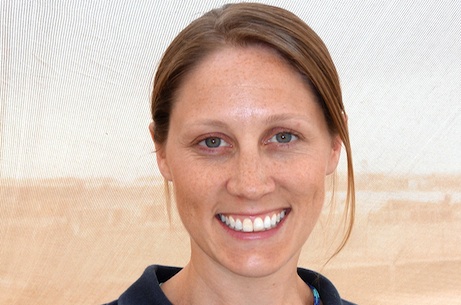
Lindsey Murray's research will focus on how to establish a criminal justice system that works in the Middle East with a specific focus on Afghanistan.
When she was a child Lindsey Murray said she wanted to be a police officer. Instead she has ended up as a top forensic scientist working in an international war zone and with an interest in the wider issues of how to establish the rule of law in a lawless area.
For Lindsey, that embraces much more than providing the right equipment for forensic analysis. It is about teaching people what the rule of law means and how it can improve their lives if they want it badly enough.
Lindsey, who grew up in Warsaw, Missouri, a small town of less than 2,000 people, was interested in forensic pathology from the start of her degree in biological sciences at the University of Missouri. She volunteered both in a children’s hospital and as an on call morgue technician transporting bodies from hospital to the morgue which gave her the opportunity to watch autopsies. She was all set to go to medical school to be a medical examiner. In her third year, however, she spent a term at the University of Lancaster in England which got her interested in molecular biology.
On her return to the US, she decided to do a masters in forensic science at Michigan State University rather than go to medical school, but before she started the course she went back to England and spent six months working in a pub and travelling.
Her two-year masters focused on the social structure of burial grounds in Albania around 3,000 years ago. It included a research trip to Albania to collect bones from an archaeology site for mitochondrial DNA analysis.
DNA lab
After leaving Michigan State University, Lindsey got a job in a private DNA laboratory in Washington DC working on DNA analysis in criminal cases, including homicide and sexual assault cases. The work included a fair amount of travel to testify in different cases, some of them high profile. One case concerned three 18 year olds believed to be part of a satanic group and accused of having murdered three 10-year-old boys. The case against them rested on testimony about their behaviour. There was no DNA evidence against them. They were in jail for nearly 20 years and have only recently been set free.
She worked at the lab for over five years and then got a job as a government contractor performing DNA analysis and research on Department of Defence projects. She also had opportunities to travel to South Asia as part of an expeditionary forensic capability.
Lindsey’s international experiences opened her eyes to wider social issues as she realised the magnitude of the problems involved in establishing the rule of law in conflict zones. She decided she needed more training in broader social science issues which would take into account the cultural beliefs of people in the countries concerned.
She applied to do an MPhil in Criminological Research at the University of Cambridge in part because of her experience in Lancaster and because she felt she already knew the US criminal justice system intimately.
Her focus will be on how to establish a criminal justice system that works in the Middle East with a specific focus on Afghanistan. Her interest in Afghanistan is sparked in part by the fact that US troops are withdrawing from the country. “I am interested in the wider picture regarding the rule of law,” says Lindsey. “I am interested in empowering young people, creating more awareness of criminal justice and funding for equipment. I’d like to focus on young people and how to inspire them about justice, to get them to want the rule of law.”












